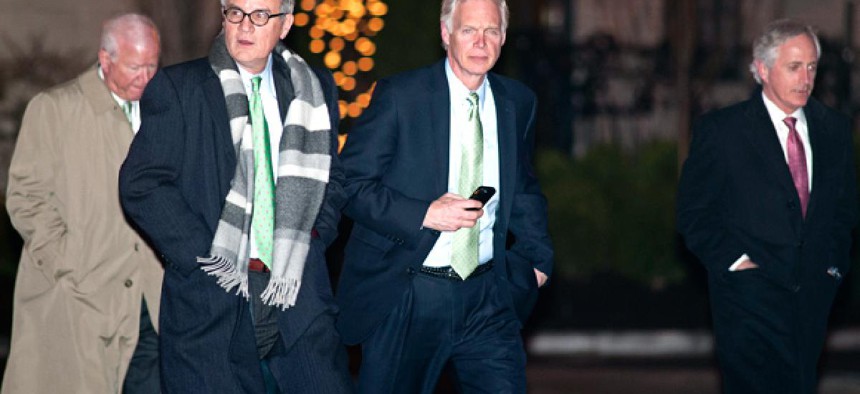Obama's Dinner With Senators Eases Tensions but Doesn't Fix the Budget
To soften partisan acrimony to fade? Just buy people a fancy meal.
It turns out that a fancy dinner can ease tensions between even long-avowed frenemies.
That was the Republican senators’ takeaway from their roughly two-hour dinner on Wednesday night with President Obama at the Jefferson Hotel. Among the topics discussed: Medicare and Social Security spending; tax reform; and the need for a big deficit deal by early August.
“To me, we’ve got four or five months here where something constructive could happen,” said Republican Sen. Bob Corker of Tennessee, one of the 12 Republican attendees at the dinner. “I don’t want to heighten the debt ceiling, but we know it’s coming up.”
August is a significant month, because it marks the time when Congress and the White House must act to again raise the debt limit — a fight that few want to be as contentious as the debt-ceiling battle of the summer of 2011 when the country faced the real possibility of default.
At the dinner, the president also expressed an eagerness to reach a compromise before the realities of a second-term presidency set in and some of his leverage fades. “He talked about the political realities that if you get late in the year, you’re not going to get anything done because 2014 is coming,” said Sen. Tom Coburn of Oklahoma, referring to the looming 2014 midterm elections.
The dinner started off pleasantly enough, the senators said, with iced tea and wine served. Sens. John McCain of Arizona and Lindsey Graham of South Carolina sat on either side of the president. Sen. Ron Johnson of Wisconsin, a self-described steak-and-potatoes guy, ate just that — meat and potatoes. The group engaged in about five to 10 minutes of small talk before settling into a wide-ranging conversation about all matters related to the budget.
The feeling was that sequestration was here to stay, for now. The continuing resolution to keep the government funded for the rest of the fiscal year would pass with ease by its deadline of March 27. The next looming battle or “cliff" was really over the debt ceiling, several senators said.
The timetable to tackle a big budget deal hinged on the months leading up to that deadline, which could hit as late as early August, depending on the Treasury Department’s estimates of the rate at which the federal government is spending its money.
Now, the goal seemed to be to construct a deal before that deadline. “The shorter time in which we try to construct this, the more likely we are to get something done,” said Sen. Richard Burr of North Carolina, another attendee, citing the congressional August recess as the perceived deadline.
The idea of revenue — the way to raise it and the amount necessary — remains a sticking point, Johnson said. Even at the dinner, he said, the differing approaches toward taxes showed. The Republicans want revenue to come through tax reform and the economic growth they say lower rates will generate, while the Democrats want to raise revenue by both increasing taxes on wealthy people and closing tax loopholes.
Overall, though, the Senate Republicans seemed temporarily charmed and won over by the White House’s invitation and dinner. The conversation was sincere, honest, and genuine, many said — evidence of how effective politically a little charm offensive can be. The president also plans to visit Capitol Hill next week for lunch with the Senate Republicans and for a separate meeting with the House Republicans, the day after House Budget Committee Chairman Paul Ryan, R-Wis., releases his budget blueprint.
“This is the first step that the president has made to really reach out and do like other presidents in the past: develop relationships and build confidence and build trust,” Coburn said. “If they continue to do that, that’s how you set up to get something done.”
This article appeared in the Friday, March 8, 2013 edition of National Journal Daily.
NEXT STORY: Play of the Day: Rand’s Very Long Stand





